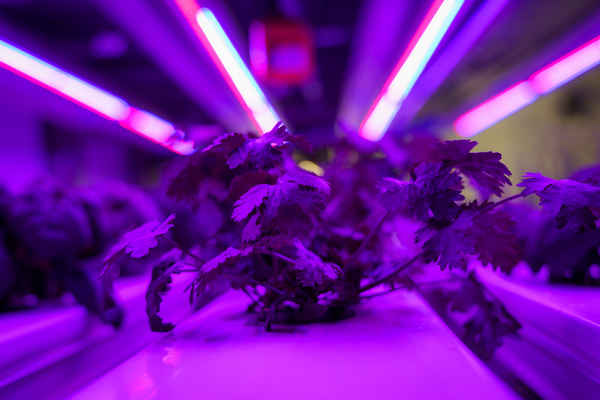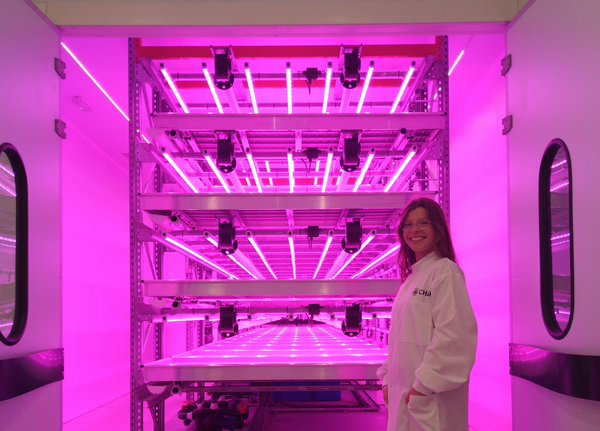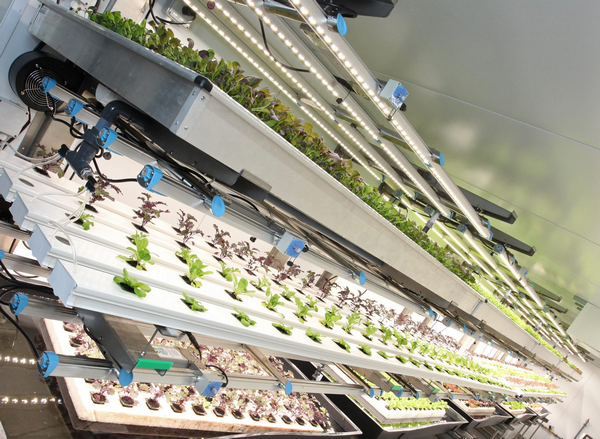In recent years, vertical farms have been popping up all over the world as a way to produce food more efficiently and sustainably. And the UK has been getting in on the action, housing Jones Food Company, for instance, one of the largest vertical farms in Europe. Yet, the UK vertical farming industry is still in its infancy. But with the right support, it has the potential to grow into a thriving sector that can help to feed the nation while also protecting the environment.
CHAP, short for Crop Health And Protection, is an agri-tech innovation center funded by Innovate UK whose goal is to advance the UK VF industry, building networks between scientists, farmers, innovators, businesses, and the government to understand what's happening in the industry. "Ultimately, the goal is to secure a more sustainable future for agriculture in the UK," says Janine Heath from CHAP.

Janine Heath
Ongoing R&D and trials to improve the state of farming
Next to getting different industry stakeholders together, CHAP has R&D facilities in some of the UK's leading institutions. Through these facilities, collaborators, including growers, can trial cultivation methods, equipment, and so on before implementing them in their operation or business. "We welcome people to work with us to run projects for their vertical farm or affiliated business," she points out. Since CHAP's facilities are not for commercial use, they are perfect demonstration sites for novel techniques or to carry out research.
"Companies that work with us can leverage our vertical farms and expertise to fine-tune their technology here. I have seen companies exploring really unusual and wacky stuff here," she chuckles. That is especially important when such an unusual solution may have already proved itself to be unsuccessful, and that's also when CHAP comes into play. "We try to figure out why something has failed in the marketplace and address that failure."

Combining start-ups with innovation
Because of the great necessity of further understanding of the complexity of vertical farming, Janine says that companies don't have to necessarily be a member of the CHAP's network to collaborate with them. Yet, a membership grants specialists to help companies, particularly start-ups or those in their infancy.
"When a company joins the membership scheme, they are given a specialist contact who works with them and helps address what they need," she says. She points out that membership is especially valuable for small-medium businesses as they would receive a more tailored, one-on-one contact with CHAP.
In this way, growers can also appreciate wider expertise, for example, marketing or regulatory support. "Whatever growers need with regards to marketing, business-wise, project management. We can help them," she points out. "For instance, if a technology comes from outside the CEA space, we can help the company to understand the agricultural market to establish themselves quickly."

Minimizing risks
Vertical farming is inherently an innovative sector, yet adapting to innovation can be scary for growers, according to Janine. Admittedly, going from conventional systems to investing in vertical farming is a significant change in mindset. "Are you willing to take a risk or not?" is the bottom line, says Janine.
"Our job is exactly to demonstrate the true potential of vertical farming and minimize that risk. Education is then paramount in this sector, and you need to be able to mitigate risk from growers' minds and show them that we are at a tipping point in agriculture, and we need to work together to show the benefits and make it work for everyone."

Lights are trending
Mostly trending right now at CHAP's facilities are innovations such as lighting trials, considering the critical issue of energy consumption in vertical farms. On top of that, there is also another challenge fast approaching: the ban on peat.
"We are running an exciting project with AEH Innovative Hydrogel, where we are looking into a peat-free substrate that is recyclable and improves the sustainability of vertical farming. This is critical because vertical farming has always been driven by the need to be more sustainable and environmentally friendly, whether that's from an energy use perspective or actually addressing the need to adjust our diet – thinking of plant-based proteins, for instance. There's a huge potential for this space, and we should seize it as much as we can."
 For more information:
For more information:
Janine Heath, Marketing communications
[email protected]
CHAP Solutions
www.chap-solutions.co.uk
